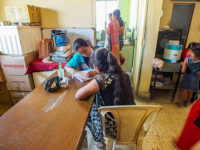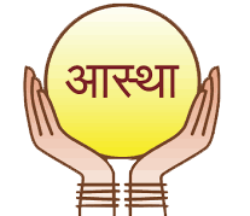
A volunteer interviewing a teenage girl from the community about her knowledge of period hygiene at a recent health camp.
Periods have been a historically stigmatised issue in India. Although the stigma is decreasing, some temples still do not allow menstruating women on the premises and many young women associate their period with a sense of shame and impurity.
Due to this stigma, young women in impoverished communities do not have access to the education and materials required to maintain good period hygiene. In slums and rural areas, sanitary napkins are difficult to find and women either cannot afford them or do not understand how or why they should use them.
Instead of sanitary napkins, strips of cotton are washed and reused by women in impoverished circumstances. women are often too embarrassed to hang the material out to dry in a public place, so hang them up in the bathroom. The cotton typically does not dry out properly between uses, causing a build up of bacteria in the damp fabric leading to a range of infections. These infections can go untreated for some time due to embarrassment or insufficient funds to see a doctor.
At Aastha Parivaar, we are working hard to change this. At monthly health camps with our key populations, we reach out to the adolescent women in the community to learn about how much they know about period hygiene and fill the gaps in their knowledge. Thanks to our partnership with Amazon, we also gift all women of menstruating age with their own sanitary napkins, which enables them to try them out and understand the different proper hygiene can make.
On top of this, we conduct weekly Life Skill Education sessions with adolescents in impoverished communities. On top of providing counselling and an opportunity to discuss the hardships these children face, we dedicate sessions on period hygiene with the girls. These sessions are not just about learning, we play interactive games and team building exercises to create a fun and trusting environment where young women can learn to discard their shame surrounding periods and learn how to look after themselves while menstruating.
